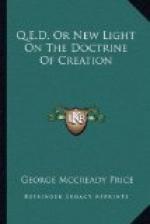Thomas Hunt Morgan sums up the present situation in the following words: “To-day the theory has few followers among trained investigators, but it still has a popular vogue that is wide-spread and vociferous.” And we may add that the extent of its spread is directly proportioned to the need felt for this doctrine as a support of the theory of evolution, while the vociferance of its advocates is inversely proportioned to the evidence in its support.
As a result of extensive modern experiments and discussion, biologists have grown very cautious, and are by no means so positive as they were twenty years ago in affirming just how species have come into existence. Echoes of this old controversy between the two leading schools of biologists are occasionally heard; but the enthusiasm with which they set out a half century ago to solve the riddle of plant and animal life has largely given way to a purpose to discard speculation and patiently to observe and record actual facts. For with natural selection discredited in the house of its friends, and Lamarckianism under grave suspicion from want of a single well authenticated example, it is hard to see what there is left of the biological doctrine that has so dominated scientific thought for a half century. If each of these opposed schools of scientists are right in what they deny, the whole theoretical foundation for the origin of new kinds of animals and plants is swept away,—absolutely gone. For if an individual really cannot transmit what he has acquired in his lifetime, how can he transmit what he has not got himself, and what none of his ancestors ever had? And if natural selection cannot start a single organ of a single type, what is the use of discussing its supposed ability to improve them after the machinery is all built?
II
Such was the general condition of theoretical biology about the beginning of the present century. In the meantime those who were dealing with the empyrical or experimental side of these problems were seeking for the causes of and the rules for variation. All living things vary from one generation to another; the question was, Why do they vary? and do these variations really represent new characters comparable to new species in the making? or are they, so to speak, but an elastic reaction of the internal vital elasticity of the organism, all the while latent and only seeking a favorable expression, to return again under other conditions to the former type?
The effort to reduce these variations to law and system was pursued by thousands of investigators, with varying but at all times perplexing and disappointing results. But in the year 1900 the scientific world awoke to the surprising fact that a patient obscure investigator had already solved most of the puzzles of variation and heredity some thirty-five years before. Gregor Mendel, born a peasant boy, trained as a monk, and




